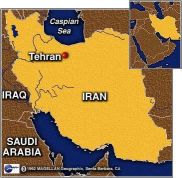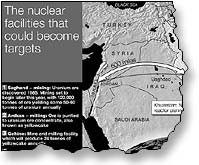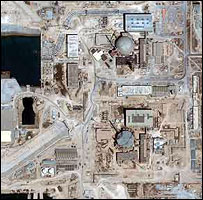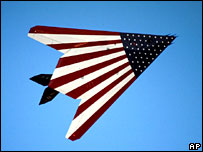|
The coming war against Iran - Part 9
Closer to a nuclear confrontation with Iran
By Daan de Wit
Indications that the U.S. is heading towards a nuclear confrontation with Iran have only become stronger of late. Plans that have existed for a long time are now being systematically carried out. Seymour Hersh writes: 'One military planner told me [...]: “People think Bush has been focussed on Saddam Hussein since 9/11,” but, “in my view, if you had to name one nation that was his focus all the way along, it was Iran.” Republican U.S. Rep. Ron Paul writes: 'Even with the horrible results of the past three years, Congress is abuzz with plans to change the Iranian government.' 'Less than three weeks after Saddam Hussein's statue was toppled in central Baghdad in April 2003, the U.S. military finished campaign planning to invade Iran', according to William Arkin, military specialist with the Washington Post. The Dutch in the original article has been translated into English by Ben Kearney. War against Iran a question of time
Arkin writes: 'I don't believe that the United States is planning to imminently attack Iran, and I specifically don't think so because Iran doesn't have nuclear weapons and it hasn't lashed out militarily against anyone. But the United States military is really, really getting ready, building war plans and options, studying maps, shifting its thinking.' In an article written at the beginning of last year, Hersh quoted experts who made it clear that war with Iran was a certainty, and that the only thing that remained unknown was the specific moment at which the war would begin. It was also at that time that Karen Kwiatkowski spoke out. Kwiatkowski is a former lieutenant colonel in the Air Force as well as a former co-worker of Douglas Feith, who has since resigned from his position as Under Secretary of Defense for Policy. Kwiatkowski: 'The bets were [when I was working in Feith's office] 'How long would it be', not whether we would do Iran, but how long it would be after Iraq that they would go into Iran'. Preparations for Iran war at the highest political levels Hersh: 'The House member said that no one in the meetings “is really objecting” to the talk of war. “The people they're briefing are the same ones who led the charge on Iraq. At most, questions are raised: How are you going to hit all the sites at once? How are you going to get deep enough?” (Iran is building facilities underground.) “There's no pressure from Congress” not to take military action, the House member added. [...] One former defense official, who still deals with sensitive issues for the Bush Administration, told me that the military planning was premised on a belief that “a sustained bombing campaign in Iran will humiliate the religious leadership and lead the public to rise up and overthrow the government.” He added, “I was shocked when I heard it, and asked myself, ‘What are they smoking?'”' Bearing this in mind, consider this quote from an earlier article by Hersh: '“The idea that an American attack on Iran's nuclear facilities would produce a popular uprising is extremely illinformed,” said Flynt Leverett, a Middle East scholar who worked on the National Security Council in the Bush Administration.' American troops already on the ground in Iran Hersh: 'If the order were to be given for an attack, the American combat troops now operating in Iran would be in position to mark the critical targets with laser beams, to insure bombing accuracy and to minimize civilian casualties. As of early Sam Gardiner is to some extent able to confirm these cooperative relationships because at the beginning of April he heard [WMV, transcript] the Iranian ambassador to the IAEA say that forces who have been arrested have admitted to having worked with American troops situated in Iran. According to a 'senior British intelligence official' it concerns a 'US Special mission unit [...] called by codenames', reports Raw Story. Gardiner wonders if Congress ever actually authorized this. But Congressional authorization is not necessary because the troops belong to the Army, not the CIA. This strategy originates with Secretary of Defense Donald Rumsfeld 'which was made official policy in the Pentagon's Quadrennial Defense Review, published in February', writes Hersh. In October of last year it was reported in this DeepJournal series that the U.S. is carrying out yet another controversial strategy - that of employing an organization which finds itself on America's official list of terrorist organizations - the MEK. This terrorist group is responsible for the deaths of, among others, Americans. But according to a 'former counterintelligence official', while the Americans were busy looking forward to Iran shortly after invading Iraq, the MEK was left all but undisturbed: '“The US army secured a key MEK facility 60 miles northwest of Baghdad shortly after the 2003 invasion, but they did not secure the MEK and let them basically be because [then Deputy Defense Secretary Paul] Wolfowitz was thinking ahead to Iran”'. Some members of the MEK have now been '"renamed" in accordance with a plan conceived by Secretary of Defense Donald Rumsfeld so that they could be "converted" into a military special ops team', reports Raw Story, which interviews a 'UN official close to the Security Council' who says 'that the newly renamed MEK soldiers are being run instead of military advance teams, committing acts of violence in hopes of staging an insurgency of the Iranian Sunni population.' The UN official concludes: '“We are already at war”'. Raw Story: 'In a stunning repeat of pre-war Iraq activities, the Bush administration continues to publicly call for action and pursue diplomatic solutions to allegations that Iran is bomb-ready. Behind the scenes, however, the administration is already well underway and engaged in ground operations in Iran.' U.S. plans point to nuclear attack and 'patchwork quilt' Newsweek's Michael Hirsh, whilst in Iraq, envisions in this presumed strategic goal the reality of a country torn asunder; a structurally fragmented society held together by American interests. In the opening sentence of his article he writes: 'As Iraq fractures along multiple religious and ethnic lines, only one force seems to be holding it together: American involvement.' He goes on to say: 'The danger in other words is that Iraq's devolution into "regionalization" doesn't stop there but keeps on going, breaking up slowly like fractured glass. The logical conclusion is that Iraq may no longer be able to exist, as Iraq, without the glue of American involvement-in politics, in security, in Iraq's very sense of national identity.' He observes how fighting is taking place even within the sects: '[...] what we're seeing is no longer just "sectarian war" [...] between Shiites and Sunnis, with the Kurds sitting it out for the moment. The new emerging issue [...] is tensions within the sects, among Shiite groups and Sunni groups, or intra-sectarian war.'
DeepJournal
Sign up for the free mailing list. |
|
9 September 2013
Why is Syria under attack? - Part 4
‘Syria’ is about power, money, influence and energy
8 September 2013
Why is Syria under attack? - 3
Syria and Iran are like pieces on a geopolitical chessboard
7 September 2013
Why is Syria under attack? - Part 2
On the interests of the parties involved in the Syrian conflict and the role of the media
6 September 2013
Why is Syria under attack? - Part 1
Who is behind the chemical weapons attack in Syria?
1 April 2013
Albert Spits: Creëer je eigen financiële veiligheid
Beluister het interview
|




 Ron Paul, Republican member of the House of Representatives,
Ron Paul, Republican member of the House of Representatives,  This is not something that will happen imminently, maybe this year, maybe next year. Jack Straw is making exactly the same noises that the Government did in March 2003 when it spoke about the likelihood of a war in Iraq." Then the Government said the war was neither inevitable or imminent and then attacked."'
This is not something that will happen imminently, maybe this year, maybe next year. Jack Straw is making exactly the same noises that the Government did in March 2003 when it spoke about the likelihood of a war in Iraq." Then the Government said the war was neither inevitable or imminent and then attacked."' winter [2005], I was told by the government consultant with close ties to civilians in the Pentagon, the units were also working with minority groups in Iran, including the Azeris, in the north, the Baluchis, in the southeast, and the Kurds, in the northeast. The troops “are studying the terrain, and giving away walking-around money to ethnic tribes, and recruiting scouts from local tribes and shepherds,” the consultant said. One goal is to get “eyes on the ground”—quoting a line from “Othello,” he said, “Give me the ocular proof.” The broader aim, the consultant said, is to “encourage ethnic tensions” and undermine the regime.'
winter [2005], I was told by the government consultant with close ties to civilians in the Pentagon, the units were also working with minority groups in Iran, including the Azeris, in the north, the Baluchis, in the southeast, and the Kurds, in the northeast. The troops “are studying the terrain, and giving away walking-around money to ethnic tribes, and recruiting scouts from local tribes and shepherds,” the consultant said. One goal is to get “eyes on the ground”—quoting a line from “Othello,” he said, “Give me the ocular proof.” The broader aim, the consultant said, is to “encourage ethnic tensions” and undermine the regime.' On the other hand, the downside to limited air strikes is that they could leave a frustrated Iran in their wake, resulting in a country that would be more dangerous than ever after reconstruction. The only remaining option, though not mentioned in the article, seems to be a severe and extensive attack launched at a distance from the air and the sea, in which the use of nuclear weapons renders Iran virtually harmless. By taking into consideration both the neoconservative desire that a democratic movement will take shape after regime change, as well as the faith in the phenomenon of the preemptive nuclear strike [
On the other hand, the downside to limited air strikes is that they could leave a frustrated Iran in their wake, resulting in a country that would be more dangerous than ever after reconstruction. The only remaining option, though not mentioned in the article, seems to be a severe and extensive attack launched at a distance from the air and the sea, in which the use of nuclear weapons renders Iran virtually harmless. By taking into consideration both the neoconservative desire that a democratic movement will take shape after regime change, as well as the faith in the phenomenon of the preemptive nuclear strike [